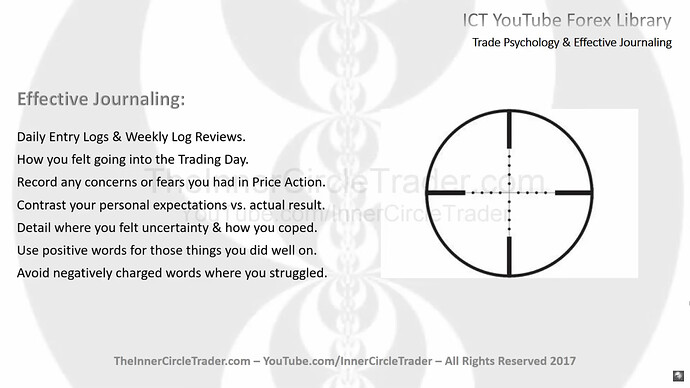Notes
- Major Psychological Barriers:
- Fear of Missing Moves
- Rooted in not fully understanding one’s setup.
- A well-defined trading plan helps reduce the fear of missing moves.
- Understanding the setup intimately and knowing the time and price consistency reduces anxiety.
- Utilize kill zones and know when and what setups to expect.
- Fear of Losing
- Often linked to seeking high accuracy in systems.
- Emphasize the need for a plan and consistency in backtesting.
- Embrace uncertainty and determine if trading is right for you.
- Impatience Between Setups
- Common in novice traders.
- Forge discipline by following the rules of the method.
- Experience teaches the importance of waiting for the best setups.
- Avoid impulsive trades that do not fit the setup criteria.
- Fear of Not Being Good Enough
- A byproduct of social media comparisons.
- Focus on personal development and avoid engaging in online competitions.
- Measure progress through personal journaling and results, not social media.
- Fear of Losing Streaks and Drawdown
- Linked to poor money management.
- Implement strategies to manage losses and reduce the effects of drawdown.
- Discipline in following rules is crucial for long-term success.
- Lack of Discipline in Following Rules
- Human nature tends to break the rules.
- Stick to a set of rigid, detailed, and binary rules.
- Discipline comes from consistent adherence to these rules, even during drawdowns.
- Searching for the Next Best Thing
- Many traders shift focus based on trends and popular methods.
- Find and stick with a method that works for you.
- Use sound money management to handle losing streaks and drawdowns.
- Confidence in your method reduces anxiety about missing moves.
- Fear of Missing Moves
- Effective Journaling
- Daily and Weekly Journals
- Make daily entries regardless of trades.
- Weekly reviews, usually on Saturdays, to reflect on performance.
- Recording Emotions and Experiences
- Document feelings and thoughts during trades.
- Record physical and emotional states as they influence trading decisions.
- Honest entries help identify patterns and improve discipline.
- Handling Personal Issues
- Personal issues impact trading performance.
- Avoid trading during emotionally turbulent times.
- Use the journal to release and analyze personal stressors affecting trading.
- Screen Captures and Notations
- Capture charts and annotate thoughts and setups.
- Visual records help in learning and future reference.
- Note anxiety points and how setups panned out.
- Positive Reinforcement
- Highlight successful executions and adherence to plans.
- Use positive language to reinforce good behavior and decisions.
- Avoid Negative Self-Talk
- Do not use negative terms when documenting mistakes.
- Focus on learning opportunities from errors without self-criticism.
- Develop Coping Mechanisms
- Identify and document effective stress-coping mechanisms.
- Apply these skills in both trading and personal life.
- Daily and Weekly Journals
Major Psychological Barriers
Effective Journaling
Next lesson: ICT Forex - Market Maker Primer Course - COT Insights For Effective Price Action Analysis
Previous lesson: ICT Forex - Market Maker Primer Course - Target Selection & Profit Objectives


